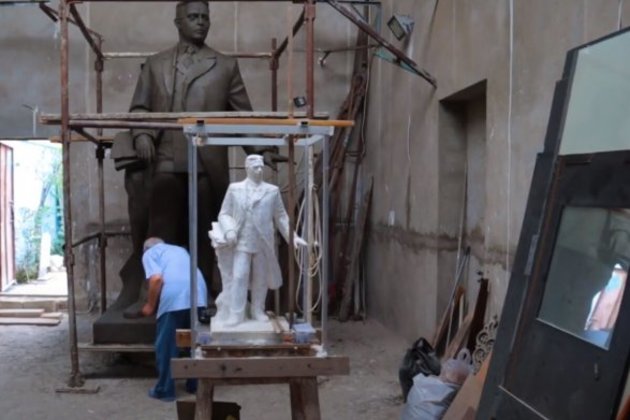Last autumn's six-week war led to a rapid victory for Azerbaijan, and now the town of Shusha is being recast in the victor's image. Three decades after he fell victim to a bout of wartime cancel culture, the bust of Uzeyir Hacibeyli, composer of Azerbaijan's national anthem, is back in what fans consider its rightful place, The Telegraph journalist Colin Freeman writes. In Soviet times, the bronze sculpture of the country's greatest classical musician stood proudly in the centre of Shusha, the town regarded as the cultural capital of the disputed region of Nagorno Karabakh.
But after Nagorno Karabakh fell into the control of Armenian separatists in the early 1990s, Hacibeyli's bust was used as target practice by gunmen and sold to a scrap metal dealer in Georgia, from where it was salvaged by Azerbaijan's culture ministry.
Now, with Shusha recaptured by Azerbaijani forces during last year's renewed hostilities, Hacibeyli's bullet-scarred bust once again looks out over the town square, where the Azerbaijani flag now flies from the nearby town hall. Also restored are busts of Khurshidbanu Natavan, an Azerbaijani poet, and Bulbul, a famous singer, likewise dusted off after decades of safekeeping in Azerbaijan's Museum of Arts.
“These monuments stood here before the war of 1988, but the Armenians fired on them to show their disdain for Azerbaijani culture,” said Zaur Ferhadov, an official in the Azerbaijani Foreign Ministry. “We've now restored the statues, but we've left the bullet marks as a reminder of the aggression that was shown towards them.”
The most prized re-possession is Shusha - a hilltop town of mosques and churches - Nagorno Karabakh's cultural capital. During the 1988-94 war, it was the scene of a major victory for Armenian separatist troops, but last year Azerbaijani troops then scaled Shusha's slopes to replant the Azerbaijani flag, a move that helped force Armenia into signing a Russian-brokered ceasefire deal.
“It was a very hard battle because we were fighting uphill, but we were happy to do it because Shusha is part of our cultural heritage,” said Colonel Gafarov Mushvig. Col Mushvig was speaking to The Telegraph during a media visit to Shusha organised by the office of Mr Aliyev. The president has already visited Shusha several times, opening three new hotels and promising that after decades of Armenian “savagery”, Shusha will now become a tourism haven. “Shusha will become one of the cultural capitals not only of Azerbaijan, the region, but also of the world,” he declared.
Azerbaijan has put a lot of money into a massive reconstruction project for the reclaimed areas, starting with a “Victory Road” re-connecting Shusha to the rest of Azerbaijan. Several brand new power stations have been built. In Shusha itself, work is underway to replace the town’s ageing Soviet-era housing stock, much of which has lies wrecked by the war, and to restore Azerbaijani museums and cultural sites.
Among the army of construction workers is Seymur Nasibov, 42, who was one of thousands of Azerbaijanis forced to leave when it was captured by Armenian forces in 1992. “I was just 14 at the time - the place was being bombed and when Armenian troops entered, we fled,” he said, as he showed the Telegraph around the bomb-wrecked apartment block where he grew up. “Every day after work I return to visit this old flat, even though it is now minus windows and doors - it feels like a miracle to be back here.”






